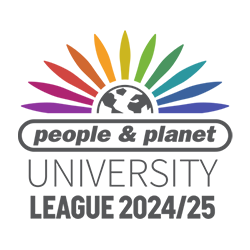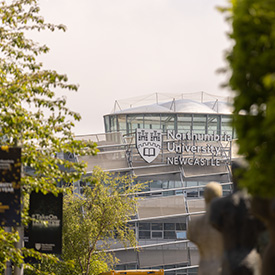-
Study
-
Undergraduate
- Search for a Course
- Undergraduate Open Day & Events
- Application Guides
- Northumbria University UCAS Exhibitions
- Foundation Years
- Undergraduate Fees & Funding
- School & College Outreach
- Continuing Professional Development
-
Postgraduate
- Postgraduate Study Degree
- Postgraduate Research Degrees
- Postgraduate Open Days and Events
- Postgraduate Fees & Funding
- Flexible Learning
- Thinking about a Masters?
- Continuing Professional Development
- Change Direction
-
Student Life
- The Hub - Student Blog
- Accommodation
- Life in Newcastle
- Support for Students
- Careers
- Information for Parents
- Students' Union
- Northumbria Sport
- Be Part of It
-
-
International
International
Northumbria’s global footprint touches every continent across the world, through our global partnerships across 17 institutions in 10 countries, to our 277,000 strong alumni community and 150 recruitment partners – we prepare our students for the challenges of tomorrow. Discover more about how to join Northumbria’s global family or our partnerships.
View our Global Footprint-
Applying to Northumbria
- European Union
- Our London Campus
- Northumbria Pathway
- International Events
- Entry Requirement and Education Country Agents
- Global Offices
-
Northumbria Language Centre
- Faculty Requirements
- Acceptable English Requirements
- Pre-sessional English Language and Study Skills
- Academic Language Skills Programmes (ALS)
-
International Fees, Funding & Scholarships
- International Undergraduate Fees
- International Undergraduate Funding
- International Masters Fees
- International Masters Funding
- International Postgraduate Research Fees
- International Postgraduate Research Funding
- International Money Matters
-
Life at Northumbria
- International student support
- Careers
-
International Mobility
- Current Northumbria Students
- Incoming Exchange Students
-
-
Business
Business
The world is changing faster than ever before. The future is there to be won by organisations who find ways to turn today's possibilities into tomorrows competitive edge. In a connected world, collaboration can be the key to success.
More on our Business Services -
Research
Research
Northumbria is a research-rich, business-focused, professional university with a global reputation for academic quality. We conduct ground-breaking research that is responsive to the science & technology, health & well being, economic and social and arts & cultural needs for the communities
Discover more about our Research -
About Us
-
About Northumbria
- Our Strategy
- Our Staff
- Place and Partnerships
- Student Profiles
- Alumni Profiles
- Leadership & Governance
- Academic Departments
- University Services
- History of Northumbria
- Contact us
- Online Shop
-
-
Alumni
Alumni
Northumbria University is renowned for the calibre of its business-ready graduates. Our alumni network has over 246,000 graduates based in 178 countries worldwide in a range of sectors, our alumni are making a real impact on the world.
Our Alumni - Work For Us
What will I learn on this module?
Owing to changing migration patterns and digital media, we live in an increasingly global society. Whilst posing many opportunities for business, the decision to internationalise a company’s offering involves as range of complex business decisions. In this module, you will explore how marketing practices can be applied to global business, and in doing so develop a thorough commercial appreciation of the complexities of marketing across nations.
The module is broadly composed of three themes:
• The Global Consumer: Consumers across the globe differ on a wide range of factors, including education levels, cultural norms, religious beliefs and wider lifestyle preferences. You will be introduced to some of these core differences, explore how cultural values differ across regions and the emergence of a global consumer culture. You will also explore how consumers tend to favour products from certain countries based on principles of country-of-origin and national identity.
• International Marketing Strategy: This theme will introduce you to the various market entry strategies utilised by organisations, including export, intermediate and hierarchical modes. Here you will explore the complexities of the global marketing environment (encapsulating political and economic differences) and developing international buyer-seller relationships.
• Global Marketing Decisions: Once an organisation chooses to internationalise, you will explore the range of marketing decisions that need to be made, including queries over product, pricing, marketing communications and branding. As part of this, you will be introduced to the ‘standardisation versus adaptation’ debate, which considers whether organisations should offer identical offerings across markets or implement a more tailored approach.
How will I learn on this module?
This module will combine an academic introduction to the core principles of global marketing. At the same time be very practice-focused, ensuring you develop the necessary skills to contribute to the field of international marketing. The Teaching and Learning Plan will provide a detailed week-by-week guide to the curriculum, alongside suggested directed reading to supplement your in-class learning.
You will be introduced to the principles through a lecture programme, where concepts will be discussed in an interactive manner. This will be complemented by a seminar and workshop programme which will allow you to apply the concepts to a range fo global marketing scenarios, as well as use this time to generate ideas and research for use in your assessment. You can therefore expect the reflective-practitioner approach to learning to be embedded in all seminar sessions, through undertake varied activities which facilitate critical analysis.
Independent learning will centre upon you identifying and pursuing areas of interest in relation to the subject area through further reading, research and reflection.
The module will draw heavily on real-life examples and case studies that will identify best practice in global marketing practice, and we will actively encourage you to follow global news networks to identify emerging trends and global challenges that can impact on marketing decisions.
How will I be supported academically on this module?
You will be thoroughly supported through this module by the Module Tutor and wider teaching team. Both lecture and seminar / workshop content will be delivered by a range of staff with relevant expertise in that subject area.
You will have access to a fully populated Blackboard site for the module, which will provide you with learning materials, recorded assessment guides, links to industry developments and a discussion board to address module queries.
A full electronic reading list will be made available, allwoi9ng you to easily access relevant textbooks, journal articles and also suitable trade press material.
For the assessment, in-class time will be dedicated to ensuring students are fully prepared for each component, with students able to make 1-2-1 appointments with the module team if necessary.
What will I be expected to read on this module?
All modules at Northumbria include a range of reading materials that students are expected to engage with. Online reading lists (provided after enrolment) give you access to your reading material for your modules. The Library works in partnership with your module tutors to ensure you have access to the material that you need.
What will I be expected to achieve?
Knowledge & Understanding:
• To critically appraise the values of the global consumer (ML01)
• To appreciate the complexities of establishing business relationships to facilitate market entry (ML02)
• To consider factors which impact upon global marketing decisions (ML03)
Intellectual / Professional skills & abilities:
• To research and present market data and market proposals to a professional standard (ML04)
Personal Values Attributes (Global / Cultural awareness, Ethics, Curiosity) (PVA):
• Develop awareness and appreciation of how consumers think and behave across national, cultural and religious borders (ML05)
How will I be assessed?
The assessment will feature 2 components (both completed individually) and is base on the students identifying an organisation and preparing a plan for them to expand their operations to a new country.
Component One: Infographic Presentation (30%)
Students are required to produce a professional infographic which provides key information on the national market they have chosen. Students are required to print this poster and display in seminars (week 6 and 7), answering questions from the academic team.
(ML01, ML04)
Component Two: Business Plan proposal (70%)
Students will produce two pieces of work that come together to come an international marketing plan
- A 5 minute video which outlines and justifies their proposed market entry strategy
- A 2,000 word marketing plan which addresses key marketing decisions to support the market entry.
(ML02, ML03, ML05)
Pre-requisite(s)
N/A
Co-requisite(s)
N/A
Module abstract
Have you ever wondered how brand make their products and services available in four corners of the world? How companies co-ordinate their multi-million pound advertising campaigns across national TV networks and time zones? Even how consumers in different parts of the world think about products and brands in a world dominated by digital media?
Global Consumers and Marketplaces will explore such questions and provide you with a thorough appreciation of how the marketing function supports businesses in doing business internationally. You will explore global consumer trends, assess suitable market entry strategies and how international marketers make decisions on products, prices and promotion.
Through a practical piece of assessment, you will develop skills in identifying market opportunities in other countries, collating research to support your ideas and presenting a professional standard business plan to outline your ideas.
Course info
Credits 20
Level of Study Postgraduate
Mode of Study 16 months Full Time
2 other options available
Department Newcastle Business School
Location City Campus, Northumbria University
City Newcastle
All information is accurate at the time of sharing.
Full time Courses are primarily delivered via on-campus face to face learning but could include elements of online learning. Most courses run as planned and as promoted on our website and via our marketing materials, but if there are any substantial changes (as determined by the Competition and Markets Authority) to a course or there is the potential that course may be withdrawn, we will notify all affected applicants as soon as possible with advice and guidance regarding their options. It is also important to be aware that optional modules listed on course pages may be subject to change depending on uptake numbers each year.
Contact time is subject to increase or decrease in line with possible restrictions imposed by the government or the University in the interest of maintaining the health and safety and wellbeing of students, staff, and visitors if this is deemed necessary in future.
Useful Links
Find out about our distinctive approach at
www.northumbria.ac.uk/exp
Admissions Terms and Conditions
northumbria.ac.uk/terms
Fees and Funding
northumbria.ac.uk/fees
Admissions Policy
northumbria.ac.uk/adpolicy
Admissions Complaints Policy
northumbria.ac.uk/complaints














